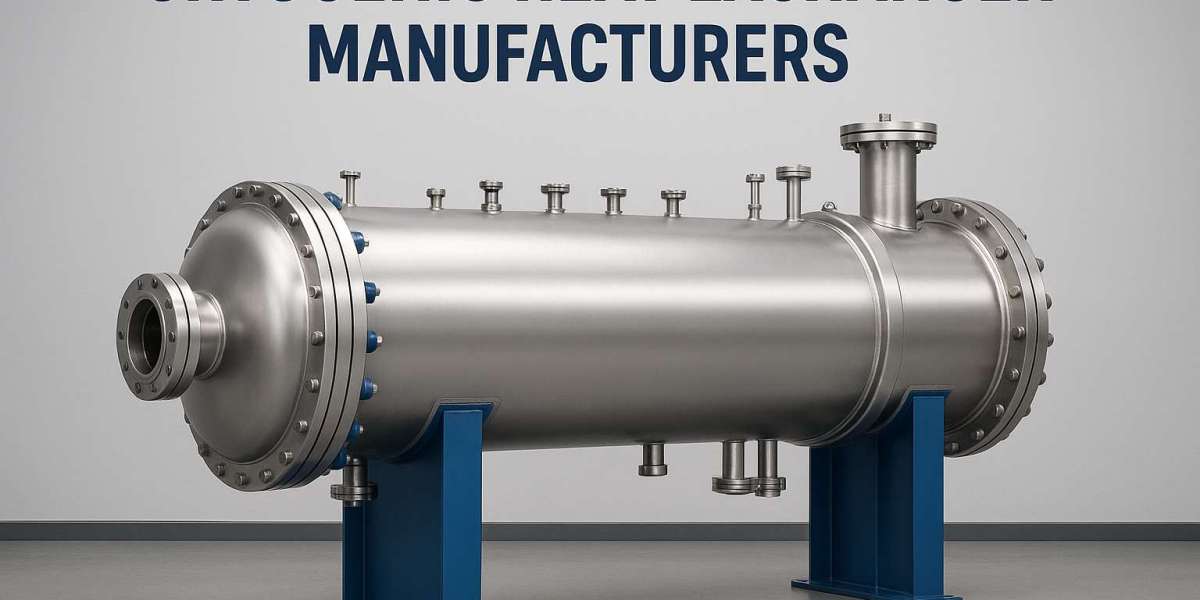The global industrial landscape is evolving at an incredible pace, with technological advancements driving efficiency, sustainability, and safety across multiple sectors. Among these innovations, cryogenic technology plays a pivotal role, particularly in industries where extremely low temperatures are required for production, storage, and transportation. At the heart of this technology are cryogenic heat exchanger manufacturers, who design and produce highly specialized equipment that ensures optimal thermal performance in some of the world’s most demanding applications.
In this article, we’ll explore what cryogenic heat exchangers are, the industries that rely on them, the key considerations when choosing a manufacturer, and how these manufacturers are shaping the future of industrial cooling.
What Are Cryogenic Heat Exchangers?
A cryogenic heat exchanger is a device designed to facilitate the efficient transfer of heat between fluids at extremely low temperatures, often below –150°C. These exchangers are engineered to handle gases like oxygen, nitrogen, hydrogen, liquefied natural gas (LNG), and other cryogenic fluids that must be cooled, liquefied, or regasified.
Unlike conventional heat exchangers, cryogenic units must be built with precise materials and designs to withstand thermal stress and prevent leakages under extreme conditions. For this reason, cryogenic heat exchanger manufacturers invest heavily in advanced engineering, specialized alloys, and rigorous testing protocols to ensure the highest levels of safety and efficiency.
Key Applications of Cryogenic Heat Exchangers
Cryogenic heat exchangers serve as critical components across various sectors. Some of the most notable applications include:
1. Liquefied Natural Gas (LNG) Industry
The LNG industry is one of the largest consumers of cryogenic technology. Heat exchangers are used for the liquefaction of natural gas at –162°C, enabling its efficient transport across global markets. Similarly, they play a vital role in regasification at receiving terminals.
2. Industrial Gases
Companies involved in the production and distribution of industrial gases such as oxygen, nitrogen, and argon rely on cryogenic exchangers for purification, separation, and storage. These gases are essential in healthcare, metallurgy, and electronics manufacturing.
3. Aerospace and Defense
Cryogenic fuels like liquid hydrogen and liquid oxygen are widely used in space exploration and defense applications. Reliable heat exchangers ensure the safe handling of these fuels in rockets and spacecraft systems.
4. Hydrogen Economy
As the world transitions to cleaner energy solutions, hydrogen is emerging as a key alternative fuel. Cryogenic exchangers are critical for hydrogen liquefaction and storage, supporting the growing infrastructure for hydrogen-powered vehicles and renewable energy systems.
5. Medical and Biotechnology
From cryopreservation to advanced imaging technologies, cryogenic systems are increasingly used in healthcare and biotech industries. Heat exchangers ensure temperature stability for sensitive applications like storing biological samples or MRI cooling systems.
What Sets Leading Cryogenic Heat Exchanger Manufacturers Apart?
Not all manufacturers are created equal. The best cryogenic heat exchanger manufacturers distinguish themselves by combining engineering expertise, high-quality materials, and a strong commitment to innovation. Here are some qualities to look for when evaluating suppliers:
1. Advanced Engineering and Design Capabilities
Manufacturers who invest in cutting-edge software, simulation tools, and computational fluid dynamics (CFD) can optimize the design of heat exchangers for maximum efficiency. Custom engineering solutions tailored to specific client needs set industry leaders apart.
2. Material Expertise
Cryogenic applications require materials with excellent thermal conductivity, corrosion resistance, and structural integrity under extreme temperatures. Manufacturers experienced in working with stainless steel, aluminum alloys, and nickel-based alloys ensure durability and safety.
3. Compliance and Safety Standards
Reputable manufacturers comply with global standards such as ASME, ISO, and API. They also carry out rigorous testing procedures, including pressure testing and performance validation, to guarantee reliability in real-world applications.
4. Customization and Scalability
Every industry has unique requirements. Whether it’s a compact exchanger for a biotech facility or a massive LNG train installation, top manufacturers provide customized solutions that scale with production needs.
5. Sustainability and Energy Efficiency
With increasing emphasis on environmental responsibility, many manufacturers are innovating to reduce energy consumption, minimize emissions, and enhance overall system efficiency. This aligns with global goals for carbon reduction and greener technologies.
The Global Market for Cryogenic Heat Exchangers
According to recent industry reports, the cryogenic equipment market—including heat exchangers—is growing significantly, driven by the increasing demand for LNG, industrial gases, and clean energy solutions like hydrogen. Cryogenic heat exchanger manufacturers are expanding production capabilities and partnering with major oil & gas, chemical, and energy companies worldwide.
Regions such as North America, Europe, and Asia-Pacific are leading the adoption of cryogenic systems. In particular, Asia-Pacific is expected to see rapid growth due to the rising demand for LNG imports in countries like China, India, and South Korea. This demand creates lucrative opportunities for both established players and emerging manufacturers.
Innovations Shaping the Future
The future of cryogenic technology will be defined by innovation. Here are some of the trends that cryogenic heat exchanger manufacturers are actively pursuing:
- Compact and Modular Designs – Enabling easier installation, transport, and maintenance.
- Digital Integration – Incorporating IoT sensors and smart monitoring systems to provide real-time data on performance and predictive maintenance.
- Hybrid Materials – Experimenting with new alloys and composite materials to enhance strength, reduce weight, and improve energy efficiency.
- Hydrogen-Centric Solutions – Developing exchangers specifically for hydrogen production, storage, and transportation as the hydrogen economy expands.
- Green Manufacturing – Reducing the carbon footprint of production facilities through sustainable practices and energy-efficient operations.
Choosing the Right Manufacturer for Your Needs
When selecting a cryogenic heat exchanger manufacturer, it’s essential to align their capabilities with your industry’s specific requirements. Key considerations include:
- Track Record – Look for manufacturers with proven experience in your sector (LNG, hydrogen, aerospace, etc.).
- After-Sales Support – Comprehensive services like maintenance, technical assistance, and spare parts availability ensure long-term reliability.
- Customization Options – Evaluate whether the manufacturer offers flexible designs tailored to your system’s needs.
- Global Reach – For multinational operations, choosing a manufacturer with a global supply chain and service network can be advantageous.
Conclusion
Cryogenic technology is no longer a niche—it is becoming a cornerstone of industries shaping the global economy. From LNG and industrial gases to hydrogen energy and healthcare, cryogenic heat exchangers ensure efficient, reliable, and sustainable performance in critical applications.
The role of cryogenic heat exchanger manufacturers is, therefore, indispensable. By pushing the boundaries of engineering, embracing sustainability, and delivering customized solutions, these manufacturers are enabling industries to operate at the extreme edge of innovation.
As the demand for clean energy and advanced industrial processes continues to rise, the future for cryogenic heat exchanger manufacturers looks both challenging and immensely promising. Businesses that align with trusted, forward-thinking manufacturers—such as Precision Equipment—will be well-positioned to thrive in this evolving technological landscape.



